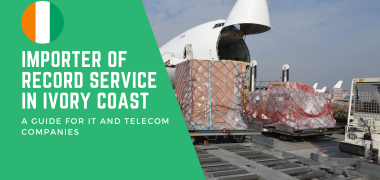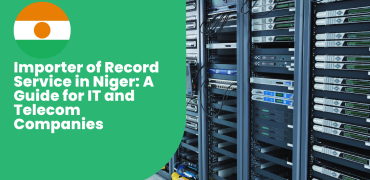The IT and telecom industries are rapidly evolving, with companies frequently expanding their operations to new markets. Guinea-Bissau, located in West Africa, presents an emerging opportunity for businesses in these sectors. However, navigating the complexities of importing IT and telecom equipment into Guinea-Bissau can be challenging. This guide aims to provide IT and telecom companies with a comprehensive understanding of the Importer of Record (IOR) service, import duties and taxes, and the special permits and approvals required to successfully import equipment into Guinea-Bissau.
Understanding the Importer of Record (IOR) Service
The Importer of Record (IOR) service is a crucial element for businesses that need to import goods into a foreign country but do not have a physical presence or registered entity there. The IOR acts as the official entity responsible for ensuring that all legal requirements are met during the import process. This includes handling documentation, paying necessary duties and taxes, and ensuring compliance with local regulations.
Benefits of Using an IOR Service
- Regulatory Compliance: The IOR ensures that all imports comply with local laws and regulations, mitigating the risk of legal issues or delays.
- Cost-Effective: Utilizing an IOR can be more cost-effective than establishing a local entity, especially for small to medium-sized enterprises.
- Simplified Process: The IOR manages all aspects of the import process, including documentation, customs clearance, and logistics.
- Expertise: IOR providers have extensive knowledge of local regulations and customs procedures, ensuring a smoother import process.
Import Duties and Taxes on IT and Telecom Equipment in Guinea-Bissau
When importing IT and telecom equipment into Guinea-Bissau, it is essential to understand the various duties and taxes that apply. These charges can significantly impact the overall cost of importing equipment and must be factored into budgeting and pricing strategies.
Import Duties
Import duties in Guinea-Bissau are calculated based on the Harmonized System (HS) code of the imported goods. The HS code is an internationally standardized system of names and numbers for classifying traded products.
- Duty Rates: The duty rates for IT and telecom equipment typically range from 5% to 20%, depending on the specific type of equipment. For instance, telecommunications apparatus, such as routers and switches, may attract different rates compared to computing devices like laptops and servers.
- Customs Valuation: Import duties are calculated based on the customs value of the goods, which includes the cost of the goods, insurance, and freight (CIF).
Value Added Tax (VAT)
In addition to import duties, Guinea-Bissau imposes a Value Added Tax (VAT) on imported goods. The standard VAT rate is 18%, applied to the customs value plus import duties.
Other Taxes and Fees
- Excise Taxes: Certain IT and telecom equipment may be subject to excise taxes, though this is less common. It is advisable to check specific product categories for any applicable excise duties.
- Customs Processing Fees: Importers may also incur customs processing fees, which cover the administrative costs of processing import documentation and inspections.
Special Permits and Approvals Required
Importing IT and telecom equipment into Guinea-Bissau often requires obtaining special permits and approvals from various government agencies. Ensuring that all necessary documentation is in place is crucial for a smooth import process.
National Agency for Telecommunications and ICT (ANAT)
The National Agency for Telecommunications and ICT (ANAT) is the primary regulatory body overseeing the telecommunications sector in Guinea-Bissau. Importers must obtain approval from ANAT for the importation of telecom equipment.
- Type Approval Certificate: ANAT requires a Type Approval Certificate for telecom equipment to ensure that the products comply with national standards and do not interfere with local networks. This certification process involves testing and verifying the equipment’s technical specifications.
- Import License: An import license from ANAT is necessary for importing certain types of telecom equipment. This license ensures that the equipment is suitable for use in Guinea-Bissau’s telecommunications infrastructure.
Ministry of Commerce
The Ministry of Commerce plays a significant role in regulating imports into Guinea-Bissau. Importers must obtain the necessary permits and licenses from this ministry.
- Import Declaration: An import declaration must be filed with the Ministry of Commerce, providing details about the imported goods, including their value, quantity, and HS code.
- Commercial Invoice and Packing List: These documents must accompany the import declaration and provide detailed information about the shipment.
Customs Authority
The Customs Authority in Guinea-Bissau is responsible for enforcing customs regulations and collecting duties and taxes on imported goods.
- Customs Clearance: Importers must submit all relevant documentation to the Customs Authority for clearance. This includes the import declaration, commercial invoice, packing list, and any required permits or licenses.
- Inspection and Verification: Customs officials may conduct inspections and verifications to ensure that the imported goods match the declared information and comply with local regulations.
Steps to Import IT and Telecom Equipment into Guinea-Bissau
Successfully importing IT and telecom equipment into Guinea-Bissau involves several steps, each requiring careful attention to detail and compliance with local regulations.
Step 1: Engage an IOR Service Provider
Engaging a reputable IOR service provider is the first step. The IOR will handle the import process, ensuring compliance with all legal requirements.
Step 2: Obtain Necessary Permits and Approvals
Work with the IOR to obtain the necessary permits and approvals from ANAT and the Ministry of Commerce. This includes obtaining a Type Approval Certificate, import license, and filing an import declaration.
Step 3: Prepare Documentation
Ensure that all required documentation, such as the commercial invoice, packing list, and import declaration, is accurately prepared and submitted.
Step 4: Customs Clearance
Submit the documentation to the Customs Authority for clearance. The IOR will manage this process, including any inspections or verifications required by customs officials.
Step 5: Pay Duties and Taxes
Pay the applicable import duties, VAT, and any other taxes or fees. The IOR will handle these payments and provide proof of payment to the Customs Authority.
Step 6: Delivery and Distribution
Once the goods are cleared by customs, arrange for delivery to the final destination. The IOR can assist with logistics and transportation to ensure that the equipment reaches its intended location.
Conclusion
Importing IT and telecom equipment into Guinea-Bissau can be a complex process, but with the right knowledge and support, it is manageable. Utilizing an Importer of Record service can streamline the process, ensuring compliance with local regulations and minimizing delays. Understanding the import duties, taxes, and required permits is crucial for successful importation. By following the steps outlined in this guide, IT and telecom companies can effectively navigate the import process and capitalize on the opportunities in Guinea-Bissau’s growing market.
Guinea-Bissau’s regulatory environment and import requirements may evolve, so it is essential to stay updated on any changes that may affect the import process. Engaging with local experts and maintaining open communication with regulatory authorities can further enhance the efficiency and success of importing IT and telecom equipment into Guinea-Bissau.




